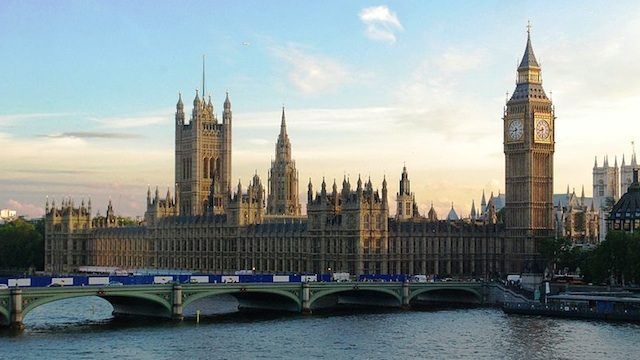SUMMARY
This is AI generated summarization, which may have errors. For context, always refer to the full article.

LONDON, United Kingdom (UPDATED) – British MPs from all sides called on Monday, October 10, for a parliamentary vote on future ties with the EU and warned hard Brexit was a “grave danger,” but the government swiftly dismissed the demand.
“We will reject any attempt to undo the referendum result,” Britain’s Brexit minister David Davis said in parliament, amid mounting pressure from former leaders of the two main opposition parties and among his own party’s ranks.
Davis said the mandate for Brexit was “clear, overwhelming and unarguable”, and warned against any attempts to “keep Britain in the European Union by the back door”, but the Conservative MP was met with heckling from opponents.
Calls for a vote came after Prime Minister Theresa May’s government was forced into an embarrassing U-turn on Sunday, October 9, when it backtracked on a proposal for companies to publish lists of foreign employees that caused widespread outrage.
“We do want parliament to debate… most notably whether we remain in the single market,” Anna Soubry, an MP from May’s Conservative Party, told BBC radio.
Soubry said there was a “grave danger” of the government drawing its own conclusions from the result of the referendum about the type of future relationship that Britons wanted with the EU.
“It is not good for our country,” she said.
‘Parliament must vote’
Former Labour Party leader Ed Miliband said on Twitter: “The PM must get parliamentary consent for her Brexit negotiating position. No referendum mandate for hard Brexit nor a Commons majority”.
“Negotiating secrecy won’t wash as an excuse. The country has a right to know the government’s Brexit strategy and parliament must vote on it,” he said.
Former Liberal Democrat leader Nick Clegg told the Observer newspaper it “would not be remotely acceptable” for cabinet to decide the terms of Brexit without a parliamentary vote.
Experts say a so-called hard Brexit would mean Britain withdrawing entirely from Europe’s single market and negotiating new trade arrangements in order to impose strict immigration controls.
EU leaders have said Britain must accept free movement of people if it wants access to the single market and have warned the negotiations will be tough.
Concern that Britain is heading for hard Brexit dragged the pound down to 31-year lows against the dollar last week and prompted business leaders to call on May to avoid breaking economic ties.
Norway is instead seen as a possible model for “soft” Brexit, where Britain would be out of the EU but would retain strong economic ties, make budget contributions and allow free movement of people.
‘Will of the British people’
A spokesman for May dismissed MPs’ calls for a vote, saying: “Parliament is of course going to debate and scrutinize” the Brexit process as it goes on.
“But having a second vote or a vote as a sort of second guess of the will of the British people is not an acceptable way forward,” the spokesman said.
“We are not going to make running commentaries on what’s going on,” he said, echoing May’s words.
Davis outlined plans in parliament for a so-called Great Repeal Bill – a proposed law that May says will legally help to seal Britain’s departure from the 28-nation bloc.
He said the move, which will be introduced in the next parliamentary session, would “return sovereignty to the institutions of the United Kingdom,” adding: “That’s what people voted for on June 23rd.”
May faces further pressure this week with a High Court legal challenge arguing that there has to be a vote in parliament on whether or not Britain can invoke Article 50, the formal procedure for exit.
The dispute could end up in Britain’s Supreme Court.
The government has argued it has “royal prerogative” – an executive privilege normally applied to foreign policy – to trigger Article 50 without consultation.
May has said she will invoke Article 50 by the end of March, opening an expected two-year negotiation that could see Britain leave the EU in early 2019.
The EU has said formal negotiations cannot start until Article 50 has been invoked but May has embarked on a flurry of diplomacy ahead of a summit with EU leaders in Brussels on October 20-21.
May visited Denmark and the Netherlands on Monday. – Rappler.com
Add a comment
How does this make you feel?
There are no comments yet. Add your comment to start the conversation.